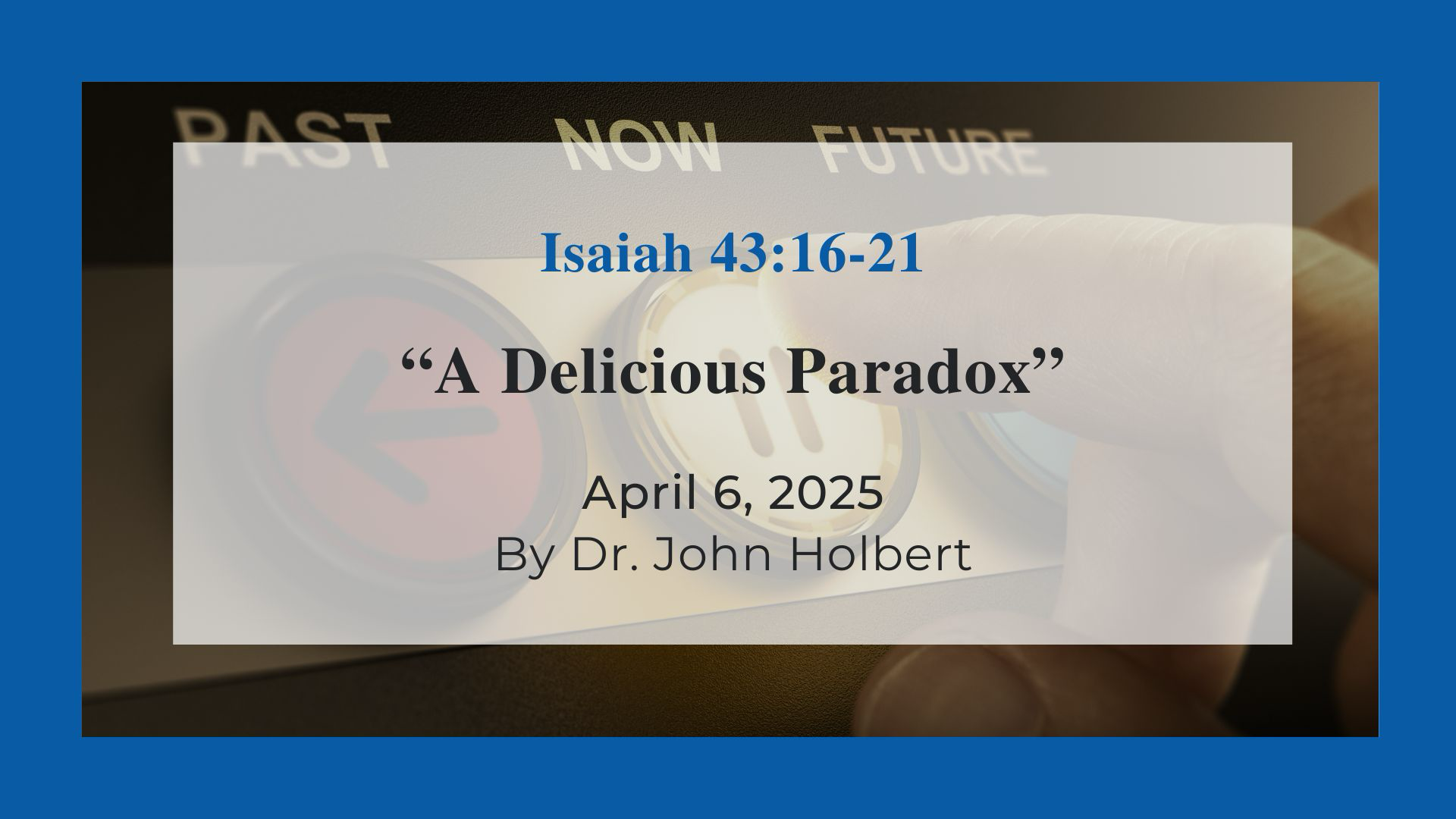A Delicious Paradox - Reflections from Isaiah 43:16-21, Lent 5, Year C
by John C. Holbert on Sunday, February 9, 2025

There are few words in the Bible that possess more resonance, more powerful echoes, than the word “remember.” In the Hebrew Bible, the word is regularly used to enjoin worshippers of YHWH always to remember: God’s creation, God’s covenant, the matriarchs and patriarchs of the past, the Torah, and on and on. It could well be said that the religion of the Israelites is based centrally on the need to remember, never to forget what God has done on their behalf. And in the New Testament, we can never forget those haunting words surrounding the ritual of the eucharist, as given in the Gospels: “Do this in remembrance of me.” The Bible is a book that calls on its readers to remember.
Well, then, just how are we to understand the startling words from that great poet, 2-Isaiah, when he admonishes his hearers in Is.43:18: “Do not remember those former things; do not think of those ancient events.” What! This demand is preceded by a clear and potent recollection of Israel’s central memory: the defeat of the Egyptian armies at the Sea of Reeds: “Thus says YHWH, who carves a way in the sea, a path through the raging waters, who brings forth chariot and horse; they lie down, unable to rise; they are destroyed, snuffed out like a wick” (Is.43:16-17). And immediately, the prophet urges us to forget it all? What sort of sense does that make: fail to remember that singular event that gave us the freedom we prize from slavery? Why, we cannot fail to remember that, can we?
In the next vs.19, Isaiah provides his rationale for forgetting those crucial claims that the faith has based its power upon; we must forget all that past stuff, if we are able to perceive that our God is not seen only in past deeds. “Look! I am doing (or “am about to do” NRSV) a new thing. It springs forth now! Can you not make it out? Even more I will make a way through the wilderness, rivers in the desert.” If we are to comprehend this Isaianic paradox concerning forgetting and perceiving, it is crucial to remember the audience to whom these phrases are addressed.
Isaiah is the poet of the exile of Israel, a prophet who is in Babylon, toward the very end of Judah’s nearly 50-year sojourn in that foreign place. The Judeans have been so long there that many of them have no personal memory of their Judean homeland, but only the recitations of priests and older members of the community who can speak of the important events of Israel’s past, the power of YHWH whose deeds form the core of Israelite belief and practice. Isaiah, not unlike that famous exilic psalm 137, is fearful that dwelling only on YHWH’s past works, experienced as very distant events and promises, now dulled under Babylonian living, Babylonian religion, Babylonian power, will dim YHWH’s present and future actions with and for the people of the promise. The psalmist of 137 cried out that Jerusalem must never be forgotten, that the old songs must be sung even in exile, that hands will wither and tongues be stilled if all that was past and now destroyed should be neglected and forgotten. But, we must not forget how that poem ends—with dead Babylonian babies, bashed against stones because revenge is the order of those who dwell only on the past. We will destroy you as you destroyed us, the psalmist cries!
Isaiah must have the same fears. When he bids Babylonian Judeans to “forget the past,” he means that if we only dwell there, we run the dangerous risk of not seeing what God is doing now for us. We will be unable to see and appreciate those roads through the blasted wilderness, those new rivers in the desert. Our God is not stuck in the past; our God is not some God who acted long ago, and has now ceased all saving activity on our behalf. We must, says Isaiah, look forward to God’s new thing.
Let me observe that in our current political atmosphere in US America, there is a siren call to look to the past, to some so-called halcyon day when we were “great,” with the implication that we are certainly not great now and never will be great until we recapture some fabled days long past. Nothing could be more dangerous or farther from the truth. We US Americans have always been a people that look forward to the future, learning from our past but generating energies toward a brighter day, a more hopeful time still to come. Like 2-Isaiah and the poet of Ps.137, we recognize the hazards of looking only backward, thereby forfeiting the exciting future ahead. It is of course a paradox to warn us against dwelling on past deeds, when those deeds have long been determinative of our ways of life. But such “stuckness” may lead to the refusal to see what God has in store for those who can perceive the future actions of a God who is forever doing a new thing. “Look! I am doing a new thing,” says God. May we perceive that newness again and again.
